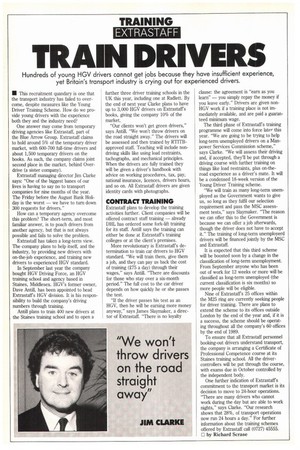TRAIN DRIVERS
Page 54

If you've noticed an error in this article please click here to report it so we can fix it.
Hundreds of young HGV drivers cannot get jobs because they have insufficient experience, yet Britain's transport industry is crying out for experienced drivers.
• This recruitment quandary is one that the transport industry has failed to overcome, despite measures like the Young Driver Training Scheme. How do we provide young drivers with the experience both they and the industry need?
One answer may come from temporary driving agencies like Extrastaff, part of the Blue Arrow Group. Extrastaff claims to hold around 5% of the temporary driver market, with 600-700 full-time drivers and about 1,500 temporary drivers on the books. As such, the company claims joint second place in the market, behind Overdrive (a sister company).
Extrastaff managing director Jim Clarke says: "One of the biggest banes of our lives is having to say no to transport companies for nine months of the year. The Friday before the August Bank Holiday is the worst — we have to turn down 300 requests for drivers."
How can a temporary agency overcome this problem? The short-term, and most familiar answer, is to poach drivers from another agency, but that is not always possible and fails to solve the problem.
Extrastaff has taken a long-term view. The company plans to help itself, and the industry, by providing new drivers with on-the-job experience, and training new drivers to experienced HGV standard.
In September last year the company bought HGV Driving Force, an HGV training school and agency based in Staines, Middlesex. HGV's former owner, Dave Antill, has been appointed to head Extrastaffs HGV division. It is his responsibility to build the company's driving numbers through training.
Antill plans to train 400 new drivers at the Staines training school and to open a further three driver training schools in the UK this year, including one at Radlett. By the end of next year Clarke plans to have up to 3,000 HGV drivers on Extrastaffs books, giving the company 10% of the market.
"Our clients won't get green drivers," says Anti]. "We won't throw drivers on the road straight away." The drivers will be assessed and then trained by RTITBapproved staff. Teaching will include nondriving skills like using load restraints, tachographs, and mechanical principles. When the drivers are fully trained they will be given a driver's handbook with advice on working procedures, tax, pay, national insurance, licences, drivers hours, and so on. All Extrastaff drivers are given identity cards with photographs.
CONTRACT TRAINING
Extrastaff plans to develop the training activities further. Client companies will be offered contract staff training — already DHL has ordered some fork-lift training for its staff. Anti! says the training can either be done at Extrastaffs training colleges or at the client's premises.
More revolutionary is Extrastaff's determination to train car drivers to HGV standard. "We will train them, give them a job, and they can pay us back the cost of training (£75 a day) through their wages," says Antill. "There are discounts for those who stay over a six-month period." The full cost to the car driver depends on how quickly he or she passes the test.
"If the driver passes his test as an HGV, then he will be earning more money anyway," says James Slaymaker, a director of Extrastaff. "There is no loyalty clause: the agreement is "earn as you learn" — you simply repay the money if you leave early." Drivers are given nonHGV work if a training place is not immediately available, and are paid a guaranteed minimum wage.
The third phase of Extrastaffs training programme will come into force later this year. "We are going to be trying to help long-term unemployed drivers on a Manpower Services Commission scheme," says Clarke. "We will assess their driving and, if accepted, they'll be put through a driving course with further training on things like load restraints, plus on-theroad experience as a driver's mate. It will be a condensed I8-week version of the Young Driver Training scheme.
"We will train as many long-term unemployed as the Government wants to give us, so long as they fulfil our selection requirement and pass the MSC assessment tests," says Slaymaker. "The reason we can offer this to the Government is because we can offer a job afterwards, though the driver does not have to accept it." The training of long-term unemployerd drivers will be financed jointly by the MSC and Extrastaff.
It is expected that this third scheme will be boosted soon by a change in the classification of long-term unemployment. From September anyone who has been out of work for 12 weeks or more will be classified as long-term unemployed (the current classification is six months) so more people will be eligible.
Nine of Extrastaff s 25 offices within the M25 ring are currently seeking people for driver training. There are plans to extend the scheme to its offices outside London by the end of the year and, if it is a success, the scheme should be operating throughout all the company's 60 offices by the end of 1989.
To ensure that all Extrastaff personnel booking-out drivers understand transport, the company is arranging a Certificate of Professional Competence course at its Staines training school All the drivercontrollers will be put through the course, with exams due in October controlled by the independent body.
One further indication of Extrastaffs commitment to the transport market is its decision to move to 24-hour operations. "There are many drivers who cannot work during the day but are able to work nights," says Clarke. "Our research shows that 28%, of transport operations now run 24 hours a day." For further information about the training schemes offered by Extrastaff call (0727) 45555, by Richard Scrase
































































































